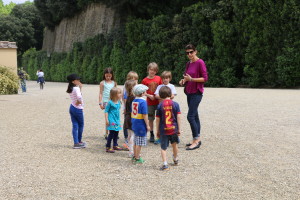 Parents who want their children to learn a language early on normally speak the language with them, but soon enough realize that this is not enough, as babies are missing the opportunity to interact with more people in that language, which would allow them to acquire a better command of the language, as well as help them perceive the need to use the language actively in certain contexts.
Parents who want their children to learn a language early on normally speak the language with them, but soon enough realize that this is not enough, as babies are missing the opportunity to interact with more people in that language, which would allow them to acquire a better command of the language, as well as help them perceive the need to use the language actively in certain contexts.
Playgroups are an effective solution in this sense as they complement the efforts of the family. A playgroup is not a language class, it’s an opportunity to speak and hear a language in a context other than home. It is a fun chance for kids and babies to play, one that is very effective because it requires interactions with multiple people and children. In any case, it is essential for parents, or other people very close to the child, to attend, both because these are the people that primarily transmit the use of the language, and because young or very young children would feel much more comfortable and safe. Parents’ presence is also important in order to provide consistency. Ideally, some of the activities conducted at the playgroup could and should be carried on at home, for instance, reading the same stories or singing the same songs, or simply revisiting the themes and words used at the playgroup. By hearing sounds, words, and phrases repetitively, you will assist your child with recognizing them and learn to use them.
Playgroups are particularly important for very young children, a fact that is easily underestimated. The first years, and the first year specifically, is when babies are most receptive to languages, so it is essential to create ample opportunities for hearing and using the language early on.
Finally, let’s not underestimate the value of playgroups for the parents themselves. Playgroups help parents to stay motivated and to be consistent, offer opportunities to compare and review their methodology, and also to see the results of their efforts. Some children who refuse to speak English at home happen to speak it without even noticing while they are playing.
At the end of the day the secret to raising bilingual children is motivation (which by the way is a key ingredient of success in most circumstances). Parents need motivation to stick to a methodology and be consistent. Children need motivation to speak the language. One of the main objectives of the playgroups is precisely this, keeping parents and children motivated.
By Letizia Quaranta, founder of Bilinguepergioco
 Add to favorites
Add to favorites
Connect